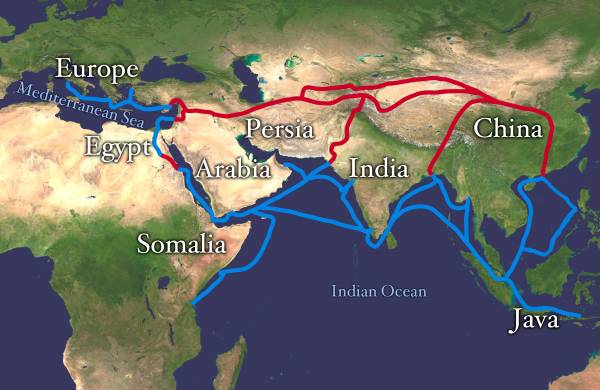On Commerce and Trading
The Mercantile Guild has been through some rough times at the beginning of the 13th century. Lorenzo Contarini has held the office of the Guildmaster for over thirty years, and his death was followed by chaos, when other organisations tried to rise next to the well-established Guild.
The Mercantile Guild and the Portal Network
Following Lorenzo Contarini's death, Marcus Karlson took his office, mostly to enact his own agenda, rather than improving the standing of the Guild. He held it for only a year, and was succeeded by Valentina Envoy, who turned out to be Contarini's illegitimate daughter.
She had previously proven herself as the Guild Steward of Constantinople, and there were no doubts about her ability to hold the office. She put the Guild back on track, with only few changes. The most important one of them was the decision to elect the Guildmaster every ten years, for the sake of more public actions of the people in charge. The Council aiding the Guildmaster has also became more overt and better known to the other members of the organisations.
Valentina advocated for fairness in business and lack of affiliation to any country in particular. Despite marrying the Byzantine Emperor Isaac Angelos, she kept the high standard she set out, and was re-elected as a Guildmaster many times, until she passed away at the age of 68.
During her time Osmund, Lord Shipwright became a patron God of the Guild. To gain his favour, Guildmaster Valentina Envoy had issued guidelines that encouraged merchants to use ships as the primary mode of transport, and warned them to avoid the services of the Order of the Gatekeepers. Some people claim that she was threatened by Osmund, but most agree that she willingly entered an arrangement with him. After all business is business. The Guild started offering insurance for travelling by sea, while “incidents” involving shipwrecks dropping from the sky near the open portals became more and more common.
The Peasants Union
Marcus Karlson's rule as the Guildmaster was short, but eventful. Never before and not for the years to come have peasants revolted in such numbers. The revolution was stifled, but the ideas are not so easily gotten rid of. It has sent a message to the nobles, a warning to pay attention to the common people. It has also encourage people of the same trade to come together.
Since then many small guilds were established: weaponsmiths, scribes, grocers, shoemakers, and other craftsmen have sought people of the same profession to share their troubles with and look for guidance.
The Free Masons and what came of it
Following the fall of Aelindis, Forwin 'Gruff' Griff has assumed control of the masons and of what became known as the Thieves' Guild. It took a brilliant mind to combine two seemingly unrelated organisations in such an ingenious fashion, but he managed it.
The Masons acted very openly, offering their services to anyone who could afford them. The best of the best used fae magic to reinforce the walls. What is not widely known, is that they also used their talents to create secret passageways, hidden even from their employers. That's how the thieves managed to access the nobles' houses. Forwin Griff took advantage of the already established reputation of the Free Masons, and made sure they remained trustworthy. He was a patient person, and would sometimes wait years until scheduling a burglary at a house his people had built, to make sure no one connected the two groups together, or to him.
In return for creating the secret entrances, the Thieves share their profits with the Masons, as well as make sure they can show off their skill, by sometimes - albeit rarely - sabotaging buildings of great importance. The Masons then come in and graciously repair the damage, and the cycle continues for many years.
Forwin Griff, a skilled craftsman and rogue himself, liked getting his hands dirty. They say it was one close call too many, that made him abandon his position as the mastermind. It's difficult to tell if his successor lacked his ingenuity or was it something else, but after he stepped down, the rate of crimes that followed this arrangement dropped drastically.
The Silk Road
Many travellers have spent years to re-establish the trading routes to the Far East. After fighting sea monsters and the Mongol horde, many hardships on land and at sea, the trade between Europe and Cathay flourishes again.
In exchange for amber, fabrics and Venetian glass, the merchants bring back cold iron, spices and finest silk, as well as the remedy known as 'mellified man'. But especially tea. The hot beverage is gaining impressive popularity on the British Isles and in the Holy Roman Empire.
Along the routes, mercenary companies are paid to ensure the safety of the travellers. There are also guides and interpreters licensed by the Mercantile Guild to aid the merchants or anyone else who wishes to take these routes.
That is not to say that the Guild has complete control over the Silk Road. It is merely assigned the duty of taking care of it. The Silk Road is part of an agreement and subject to regulations signed by countries through which it passes, for mutual benefits and profits.

